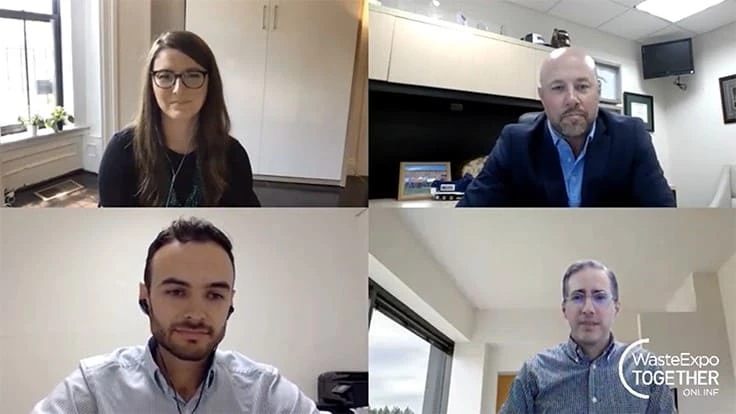
Waste Expo Together Online’s “Rising Leaders Talk Trash” session on Sept. 14 featured a panel of next generation leaders to discuss their perspective on where the waste industry is headed. The session was moderated by Big Truck Rental President Zach Martin.
Including speakers Josh Mann, public sector solutions manager for Waste Management Inc.; Turner Wyatt, co-founder and CEO of Upcycled Food Association; and Alexandria Coari, capital and innovation director for ReFed, the Waste360 40 Under 40 Award winners covered what they believe are the biggest challenges and opportunities facing the waste industry, how the upcoming workforce differs from previous generations, and how they see the industry changing.
In terms of how the trio felt the waste industry would change over the next five to 10 years, tackling food waste was a main topic of concern.
“I think one of the biggest changes and most exciting changes that I’m starting to see in the space—at least with food waste— [is] there’s this growing recognition that food waste is a major contributor to climate change,” Coari said. “I think that has major implications to the commitments that food businesses are making, the actions that investors are taking, [and] the policies that are being developed by our government and… officials.”
ReFED, which is a national nonprofit, works to end food loss and waste across the U.S. food system by advancing data driven solutions to the problem. According to the organization, its goal is a sustainable, resilient and inclusive food system that optimizes environmental resources, minimizes climate impacts and makes the best use of the food the nation grows.
Coari added, “A couple of tangible things I’d like to see really change [in the industry]… is a connection of all these disparate data sources that are out there right now that I think if brought together and made to be more real time would really change the industry for the better. Let’s talk about how much food waste is happening, but up to the minute.”
Wyatt agreed, mentioning, “When I started in this space 10 years ago, people weren’t even measuring their food waste. Now, they are, so how do we put that data into play to help reduce the problem.”
Mann, who comes from the public waste sector, said he had also seen the impact of food waste during his time at Waste Management.
“It’s exciting times… California is typically the leader in waste and recycling efforts and the state is definitely championing getting the organics out of landfills and into much more productive uses,” he said. “Certainly, if there’s an opportunity to recover the food before it goes to waste, that is job No. 1, and I’m working with a lot of communities to strengthen their ties to local food banks and shelters and soup kitchen programs, so, that really is the No. 1 way to reduce food waste over all.”
In addition to Waste Management’s food recovery efforts, Mann said the company is also working to design programs that best make use of its organics for composting or energy production.
“It’s definitely a complex situation in the fact that the market is slowly responding, so we’ve got a lot more material than we have capacity for right now, but we’re finally starting to see the shift and I think you’re going to see some really amazing things come out of California in the next couple years in regards to curbing food waste,” he said.
In order to compete with these shifts in the waste industry, the panelists each had different thoughts on what new technologies they would like to see in their respective space.
“Waste Management has been making huge strides in technology investments, so, we’re getting to see firsthand the tools of the trade,” Mann said. “I think early on, the technology was very supplemental in the industry; it was how we managed our billing, our customer data, [and now] to where we are today where it’s really the backbone of how most industry companies operate.
He added, “I can tell you that the big thing for [Waste Management] is the use of GPS and cameras to basically capture every service that we provide every single day. Ultimately, I think that’s where the industry is going… you know, Amazon really revolutionized how people track their goods that they purchase, and I think in the same way there is going to be a shift in our industry from the collection side in terms of being able to demonstrate without a doubt that we’ve provided that safe, reliable service because you’re going to get a service confirmation or you’ll be able to get a service time window because the data is just that good.”
Meanwhile, Coari credits several innovators in the food recovery space, such as Leanpath and Wasteless, for providing platforms to allow businesses to track their food waste.
“Hopefully going forward there will be this coalition of solution providers and food businesses that really want to pull back the curtain a little bit. You know, anonymized, of course, non-attributable data, but [for] that data to be speaking to each other so we can start to understand the analysis and what the economics [of food diversion] looks like.”
Latest from Waste Today
- Capital Waste acquires Tennessee Waste Haulers
- Van Dyk partners with Reckelberg Environmental Technologies
- CRI submits comments to CalRecycle on CRV handling payments
- Reworld acquires EnviroVac Waste Transport
- Waga Energy partners on RNG project at France landfill
- Hawaiian county selects landfill site
- CAA submits final draft program plan in Oregon
- Washington city adds organics collection to waste service





